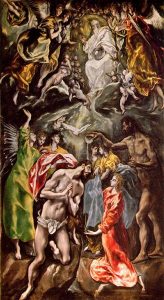9 In those days Jesus came from Nazareth of Galilee and was baptized by John in the Jordan. 10 And just as he was coming up out of the water, he saw the heavens torn apart and the Spirit descending like a dove on him. 11 And a voice came from heaven, “You are my Son, the Beloved; with you I am well pleased.” 12 And the Spirit immediately drove him out into the wilderness. 13 He was in the wilderness forty days, tempted by Satan; and he was with the wild beasts; and the angels waited on him. 14 Now after John was arrested, Jesus came to Galilee, proclaiming the good news of God, 15 and saying, “The time is fulfilled, and the kingdom of God has come near; repent, and believe in the good news. [Mark 1:9-15, NRSV]
Baptism of Christ, El Greco 1608; Christ in the Desert, Ivan Kromsky 1872; Sermon on the Mount, Carl Heinrich Bloch 1877
To talk about Jesus of Nazareth – who he was, what he did, and what he wanted to see his disciples do – “we must speak first and above all about the reign of God” [Gerhard Lohfink]. Jesus was all about the kingdom of God, his singular preoccupation.
Over a space of seven short verses, Mark describes three events that stood at the very beginning of Jesus’ public ministry and provides a veritable blueprint for the Christian vocation: his baptism in the Jordan, his temptation in the wilderness, and his proclamation of the kingdom of God.
These triple events reveal, in that order, first, Jesus’ experience of call to ministry, second, how he spiritually prepared for ministry, and third, what the non-negotiable focus of his ministry was going to be from start to finish – from the baptismal-water of the Jordan to the Cross on Calvary. Mark’s portrayal of these triple events at the very outset of his Gospel yields a lasting pattern for vocation and preparation, focusing as it does on the questions of identity, intention-purification, and kingdom-orientation.
The first panel: Jesus’ identity at baptism
Identity-recognition is key to vocation.
Marking his departure from years of anonymity and the beginning of his public ministry, the baptismal event was truly a defining moment – a call-experience – in Jesus’ life. There, Jesus’ appreciation of his identity was pivotal, as he experienced a call to ministry at the very moment when he heard the affirmation that he was Son of the loving Father – “Thou art my beloved Son; with thee I am well pleased”. That is the very first key. Portraying a prayerful Jesus, Luke says it was as Jesus was praying after he had been baptized, that he heard the voice and the message of love from heaven.
The moment he came to know himself as Son in relation to God as his loving Father, Jesus’ heart was set on doing the Father’s will. At last, his whole mission here on earth was crystallized in a clear vision. Mentored and nurtured by Mary and Joseph in the Holy Family of Nazareth, to whom the divine will had been privately revealed, Jesus had longed to hear the voice of revelation from God that he indeed was the elect of God. Now, that voice has come to him from on high. Right there, and for the first time, Jesus’ vocation was clarified. So decisive was the moment that it was truly the hour of his calling. To Jesus, the time has come for him to absolutely commit his life to the Father in public ministry. And to us, a crucial lesson is revealed: identity and vocation are inseparable.
The second panel: the temptations of Jesus in the wilderness
Temptations, which follow immediately after baptism, is key to ministry-discernment.
From baptism, Jesus was led into the wilderness by the Spirit to face the devil squarely. There, engaged in (fasting,) reflection and prayer, Jesus struggles with Satan several times, each time opting for fidelity to God and choosing a renewed and deeper trust in God’s ways. Once again, the Gospels underscore the fact that Jesus found himself drawn into deeper communion with God. Once again, this encounter with God provided Jesus with the light and strength he needed to defeat the challenges of Satan.
The shocking revelation of the Lord undergoing temptations in the wilderness forces upon ministers of all shades some harsh lessons on vocations in and for the Church. The ultimate meaning of all temptations comes to light only when we take a close look at the temptations of Jesus in the wilderness:
- In every temptation, the question is whether human beings will seek their apparent fulfillment apart from God and in opposition to His plan.
These narratives of temptations summon would-be “ministers” to scrutinize whether they are pursuing personal agendas far from the vision of God – surely an antithesis of vocational authenticity. They call us to purify our intentions.
Too often, ministry flounders not for want of an initial genuine desire to serve. Rather, ministry suffers for the lack of truthful spiritual struggle with the devil early in life. Of singular importance here is the need to purify one’s intentions, especially when ministers think, and say, that they are making great sacrifices “serving God”, “doing God’s work”, “serving the Church”, “rendering service to Christ and His people” and all the other claims that religious enthusiasts normally make. The truth is, we are perennially tempted by the three P’s which constitute the basic obstacles to the coming of the kingdom of God: power, prestige and possessions. They symbolize the three perennial curses fallen humanity displays with such run-away ferocity: greed for possessions, lust for power, and craze for money. To do God’s work, Jesus knew that He had to live by a reversal of worldly values. By placing the temptation-story immediately after Jesus’ call-experience at baptism, Mark suggests that vocations and temptations are closely linked, just as he alerts us to the testing times that will certainly come up in the course of living out our Christian calling. Truthful spiritual preparation is the key.
From Jesus’ temptations in the wilderness, on which Luke supplies more details (Luke 4:1-13), we see how the devil works by way of “accuse and divide”. By innuendos, the evil one accuses God of this and that, in an attempt to sow seeds of doubt in the Son and cause a rift between them. To accuse and divide is how the kingdom of the world works.
- On his visit to Mexico in 2016, Pope Francis on 14 February celebrated Mass in a poor neigbourhood in Ecatepec where he made a blistering critique against the tripartite temptations of wealth, vanity and pride which he said “lock us into a cycle of destruction and sin.” In a market system that leaves many without what they need, its wealth “tastes of pain, bitterness and suffering” as goods destined for all are seized for the use by the wealthy few, and is like poisonous bread that corrupts family and society. With vanity, the rich chase after short-lived fame. Imprisoned in pride, they falsely elevate themselves to a higher level than they truly are, feeling that they do not share the life of “mere mortals”. These three temptations “wear down and fracture the image which God wanted to form in us.” God dreams of being Father to all humanity, “of brotherhood, of bread broken and shared.” But these three great temptations, the lies of the devil, create a divided and fractious society, “a society of the few, and for the few.”
Mark also says that as Jesus was tempted in the wilderness, there were “wild beasts”. The one “wild beast” with which Christians can identify and need to wrestle with is “self-deceit”. Given our capacity to find excuses for doing things contrary to the will of God, ministers of different shades craftily make excuses and rationalise that since we are persons of God, making great sacrifices to be where we are, going about doing so much good for so many, the rules are made for lesser mortals, not for us.
Placing the wilderness-temptation at the beginning of his Gospel, Mark further suggests that the beasts are with us very early on. Further, by placing the temptation scene so early and “immediately” after Jesus’ experience of an initiating call at baptism, Mark is telling us that as early as possible, long before people who pursue religious vocations leave their biological homes for the seminary or the formation house, they need to confront their “wild beasts” squarely, see them clearly for what they are, name them and subdue them. This is key, and must be faced truthfully as the wise one counseled: “My son, if you come forward to serve the Lord, prepare yourself for temptation” (Ecc 2:1).
Jesus’ wilderness-temptation is thus a symbol of the spiritual assimilation of the meaning of baptism and a new identity in Christ, against the onslaught of forces that urge us to forget our true identity and dignity as children of God. What we see in our modern affluent society is a subtle threat to our existence as Christians. This takes the form of a gradual blurring of a vision of genuine service, a weakening of our backbone, a sapping of our spirit, and a downhill slide in our religious commitment. We can and must give that phenomenon a name. It is called religious indifference – a growing phenomenon in every affluent society. It is a real spiritual threat to Asian Christian communities, against which the late Saint John Paul II, particularly in reference to Asia’s new found affluence generated by economic growth, had repeatedly warned. General affluence produces a bourgeois spirit which slips into a consequent lack of generosity. Today’s soft living is a negative fallout of affluence and a deterrence to religious commitment. In this regard, the spiritual masters of our times are also agreed that materialism under various forms is a greater threat to Christian life than ever before. Catholic parents who want to collaborate with God in promoting vocations for the Church have to be prepared to be heroically counter-cultural.
The third panel: preaching the kingdom of God
Just as Jesus’ singular focus from start to finish was the kingdom of God, the tempter’s singular focus was to find opportunities to lead him off course. What happened to Jesus will happen to those who follow him and undertake ministry in his name. As Christ successfully fought his temptations in the wilderness through insisting upon communion with God, and then emerged to preach the kingdom of God, he left his followers with a road map for Christian living. Our communion with Christ through our love for him becomes the genuine motivation for our work. Then, we can hope for purity of our ministry, singleness of our focus, and healing power in our thoughts, words and actions. To seek Christ is indeed to seek the kingdom of God. This is the wonderful gift of grace beginning with the gift of communion from the time of our baptism.
The kingdom, then, is a gift and a task. Becoming kingdom-Christians is the task of all Christians. Purifying intentions and holding fast to God’s kingdom promise is the only way forward for those who would follow Jesus. Only when we have struggled with the idolatrous offers of Satan, can we hope to steer clear of idolatry and worship the one true God. Then, we may learn to make profound spiritual commitments to follow Jesus not only in preaching the kingdom, but in living a life of service in tune with his kingdom-vision. The Gospels are united in teaching that to belong to Christ, is to allow Christ to claim us, to take over our orientation in life. A constant call of all the baptized, this gospel truth underlies all of our life-experiences – for where our treasures are, there we belong; the heart goes where the affection lies.
These three veritable catechetical panels constitute the blueprint for understanding Jesus’ ministry for the salvation of humanity. His whole orientation is Kingdom-preaching and kingdom-living, till death. The Gospels highlight this centrality of the Reign of God in Jesus’ life and work. His steadfast Kingdom-preaching and kingdom-living would take him inevitably to the cross. He preached the great Sermon on the Mount on one mountain; he gave up his life on another mountain. From mountain to mountain, he lived what he preached – kingdom-values and kingdom-advancement. Clearly, Jesus wants us to “seek first the kingdom of God, and his righteousness” and everything else shall be added unto us (Mt 6:33).
Copyright © Dr. Jeffrey & Angie Goh, June 2018. All rights reserved.
You are most welcome to respond to this post. Email your comments to jeffangiegoh@gmail.com. You can also be dialogue partners in this Ephphatha Coffee-Corner Ministry by sending us questions for discussion.



